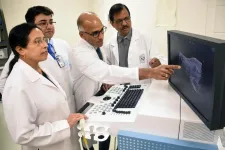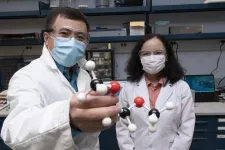Screening asymptomatic health care personnel for COVID-19 not recommended by experts
Based on a new review, routine screening of health care personnel at work should not be pursued to prevent hospital transmission, experts say.
2021-01-28
(Press-News.org) BOSTON -- Routine screening of asymptomatic health care personnel (HCP) in the absence of confirmed exposures to COVID-19 is not a recommended strategy for preventing transmission of the coronavirus causing the current global pandemic, according to a new review co-authored by an infectious disease specialist at Massachusetts General Hospital (MGH). The review, published in Infection Control & Hospital Epidemiology, found that such testing is unlikely to affect the transmission of SARS-CoV-2 in health care settings and could even have unintended negative consequences.
Many universities, sports leagues and other institutions require individuals in their organization to undergo routine testing for COVID-19, whether or not they are experiencing symptoms. Current public health recommendations are to test individuals with symptoms consistent with COVID-19 and those with confirmed exposures. At MGH and across the Mass General Brigham health system, asymptomatic employees are provided access to testing when it is required (such as for travel), but routine surveillance of health care personnel has not been pursued. "People were constantly asking: If sports teams and local universities are doing routine asymptomatic surveillance, why aren't we doing this in health care? Wouldn't it make care for our patients safer?" says Erica S. Shenoy, MD, PhD, associate chief of the Infection Control Unit at MGH, who co-authored the review with David Weber, MD, MPH, professor of medicine in the division of Infectious Disease at the University of North Carolina.
Shenoy learned that her colleagues at other hospitals were being asked the same question, so she and Weber performed a focused review of health-care-associated transmission as well as what is known about the frequency of infection among asymptomatic health care providers, addressing the common questions they had received:
What portion of asymptomatic HCP have undiagnosed COVID-19 infections?
Do asymptomatic HCP with undiagnosed COVID-19 pose an infection risk to patients?
Do patients with undiagnosed COVID-19 pose an infection risk to HCP?
Shenoy and Weber compiled data from MGH's voluntary testing program as well as several other hospitals that had either screened or made COVID-19 testing available to asymptomatic health care personnel. Infection rates ranged from 0.2% to 0.4% (i.e., 1 in 250 to 1 in 500). "That's quite low," says Shenoy. MGH's asymptomatic on-demand testing program continues, and the frequency of positive COVID-19 tests in health care personnel prevalence has remained below 1%. "This low prevalence means that in a routine surveillance approach, you would have to test a lot of people in order to detect one asymptomatic case." Given the low frequency of positive tests, the possibility of false positive results is a concern, and Shenoy and Weber describe how facilities considering routine surveillance must consider whether confirmatory testing would be used to address the possibility of false-positive results. "This is the most comprehensive paper to review publicly available results for routine COVID-19 testing of asymptomatic health care providers," says Weber.
Meanwhile, a negative test result should have no impact on a HCP's day-to-day actions, says Shenoy, who is also an assistant professor of Medicine at Harvard Medical School. "Being negative today doesn't change anything that we do in the hospital," she says. "If I test negative today, I'm still wearing my surgical mask at work and my cloth mask when out and about outside of work. I'm still physically distancing and doing my symptom monitoring." Yet it's possible, she adds, that health care providers who test negative may change their behavior and relax their guard outside of the clinical setting, such as not wearing a face covering in hospital breakrooms or choosing to attend gatherings outside of work.
The literature suggests that the risk of health care personnel and patients transmitting the coronavirus to one another is very low when effective safety protocols such as wearing masks, testing when indicated, and screening symptomatic patients are followed. Reported instances of health care personnel acquiring infection through exposures to patients show overall low risk of transmission; similarly, risk to patients from asymptomatic infected health care providers has also been reported to be low, highlighting the efficacy of current protocols, Shenoy and Weber found.
Instead of considering routine screening of health care personnel for COVID-19, hospitals should continue to focus on interventions that are known to reduce spread of the disease, says Shenoy, which also include rapid identification and isolation of patients who are suspected of COVID-19, proper use of personal protective equipment when appropriate, and testing asymptomatic patients known to have been exposed to the coronavirus. "Health care is not a bubble," says Shenoy, "and routine surveillance won't make it one."
INFORMATION:
About the Massachusetts General Hospital
Massachusetts General Hospital, founded in 1811, is the original and largest teaching hospital of Harvard Medical School. The Mass General Research Institute conducts the largest hospital-based research program in the nation, with annual research operations of more than $1 billion and comprises more than 9,500 researchers working across more than 30 institutes, centers and departments. In August 2020, Mass General was named #6 in the U.S. News & World Report list of "America's Best Hospitals."
ELSE PRESS RELEASES FROM THIS DATE:
2021-01-28
When thick, the surface layer of the ocean acts as a buffer to extreme marine heating--but a new study from the University of Colorado Boulder shows this "mixed layer" is becoming shallower each year. The thinner it becomes, the easier it is to warm. The new work could explain recent extreme marine heatwaves, and point at a future of more frequent and destructive ocean warming events as global temperatures continue to climb.
"Marine heatwaves will be more intense and happen more often in the future," said Dillon Amaya, a CIRES Visiting Fellow and lead author on the study out ...
2021-01-28
Counties with a greater number of cannabis dispensary storefronts experience reduced numbers of opioid-related deaths relative to other locales, a recent University of California, Davis, study has found. This is the first study to examine the association between active cannabis dispensary operations -- both medical and recreational -- and opioid-related mortality rates at the county level, suggesting that providing alternative pain management could improve public health outcomes, researchers said.
"While the associations documented cannot be assumed to be causal, they suggest a potential relationship between increased prevalence of medical and recreational cannabis dispensaries and reduced opioid-related ...
2021-01-28
WASHINGTON --- Pancreatic cancer, one of the most lethal of all cancers, is capable of evading attacks by immune cells by changing its microenvironment so that the immune cells suppress, rather than support, an attack on the tumor. The scientists also found that that some of the mediators of this suppressive response, including a protein called STAT1, represent potential therapeutic targets that could be used to reverse this evasion and point to possible treatment opportunities.
The finding appears January 28, 2021, in Cancer Immunology Research.
"This ...
2021-01-28
The origin of flowering plants famously puzzled Charles Darwin, who described their sudden appearance in the fossil record from relatively recent geological times as an "abominable mystery". This mystery has further deepened with an inexplicable discrepancy between the relatively recent fossil record and a much older time of origin of flowering plants estimated using genome data.
Now a team of scientists from Switzerland, Sweden, the UK, and China may have solved the puzzle. Their results show flowering plants indeed originated in the Jurassic or earlier, that is millions of years earlier than their oldest undisputed fossil evidence, according to a new study published in the scientific journal Nature Ecology & Evolution. The lack of older ...
2021-01-28
Although loggerhead sea turtles return to the same beach where they hatched to lay their eggs, a new study by a USF professor finds individual females lay numerous clutches of eggs in locations miles apart from each other to increase the chance that some of their offspring will survive.
A study published in the journal "Scientific Reports" found that some females lay as many as six clutches as far as six miles apart during the same breeding season.
"Nesting females don't lay all their eggs in one basket. Their reproductive strategy is like investing in a mutual fund. Females divide their resources among many stocks rather than investing everything in a single stock," said Deby Cassill, biology professor ...
2021-01-28
Researchers with the Kansas City Veterans Affairs Medical Center and North Dakota State University have designed a new way to deliver pancreatic cancer drugs that could make fighting the disease much easier. Encapsulating cancer drugs in nanoparticles shows potential to target tumors more effectively and avoid danger to other parts of the body.
The study results appeared in the Jan. 4, 2021, issue of the journal Molecular Pharmaceutics.
Study author Dr. Sushanta Banerjee, a researcher with the Kansas City VA and University of Kansas medical centers, explains that this technology has the potential to drastically improve Veterans' cancer care. "Veteran health care will benefit immensely from such therapeutic models, as they are ...
2021-01-28
UPTON, NY--A team of researchers led by chemists at the U.S. Department of Energy's (DOE) Brookhaven National Laboratory has identified new details of the reaction mechanism that takes place in batteries with lithium metal anodes. The findings, published today in Nature Nanotechnology, are a major step towards developing smaller, lighter, and less expensive batteries for electric vehicles.
Recreating lithium metal anodes
Conventional lithium-ion batteries can be found in a variety of electronics, from smartphones to electric vehicles. While lithium-ion batteries have enabled the widespread use of many technologies, they still face challenges in powering electric vehicles over ...
2021-01-28
URBANA, Ill. - Getting nutrition right during a dairy cow's dry period can make a big difference to her health and the health of her calf. But it's also a key contributor to her milk yield after calving. New research from the University of Illinois shows diets containing consistent energy levels and the rumen-boosting supplement monensin may be ideal during the dry period.
"Many producers use a 'steam up' approach where you gradually increase the energy intake during the dry period to help adjust the rumen and adapt the cow to greater feed intakes after calving. Our work has shown that's really of questionable benefit for many farms, and it may be safer to just ...
2021-01-28
Global circulating winds can carry bacteria, fungal spores, viruses and pollen over long distances and across national borders, but the United States is ill-prepared to confront future disease outbreaks or food-supply threats caused by airborne organisms, says a new paper published in the Ecological Society of America's journal Ecological Applications.
Claire Williams, the paper's primary author and a research professor at American University, has spent decades studying long-range transport of tree pollen. Her early findings led to collaborations with German and Russian scientists who conducted a wide range of research - on forest genetics, atmospheric chemistry and ...
2021-01-28
Maybe space is tight in your home and you share a remote office with your spouse.
Or your partner asks you to step away from work to watch the children because they have an important call to jump on. Then you may wonder, 'Well, what makes his/her job more important than mine!'
There have been no shortage of conflicts arising from the era of COVID-19, and that includes the challenges at home between married couples.
In fact, the more a person felt that their spouse disrupted their daily routine, the more they viewed their relationship as turbulent, according to West Virginia University research.
Kevin Knoster, a third-year ...
LAST 30 PRESS RELEASES:
[Press-News.org] Screening asymptomatic health care personnel for COVID-19 not recommended by experts
Based on a new review, routine screening of health care personnel at work should not be pursued to prevent hospital transmission, experts say.



